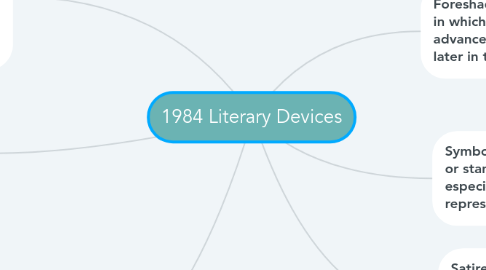
1. Paradox: A statement or proposition that, despite sound reasoning from acceptable premises, leads to a conclusion that seems senseless, logically unacceptable, or self-contradictory.
1.1. "WAR IS PEACE FREEDOM IS SLAVERY IGNORANCE IS STRENGTH" pg. 34
1.1.1. This is a paradox because of how contradicting each statement is. Each statement given by the society are literal opposites from each other, but are given to the people as if they are made to be truth. They are basically telling the people to go the opposite of their natural belief and trust in them only. This paint a picture for the totalitarian society depicted in the novel.
2. Irony: The expression of one's meaning by using language that normally signifies the opposite, typically for humorous or emphatic effect.
2.1. "Everything faded into mist. The past was erased, the erasure was forgotten, the lie became truth. Just once in his life he had possessed—AFTER the event: that was what counted—concrete, unmistakable evidence of an act of falsification." Pg. 95-96
2.1.1. The irony in this in "the lie became the truth". This symbolizes how the big brother takes every part of history pertaining to them and twists it into their own imaging, creating a "lie".
3. Flashback: A scene in a novel, set in a time earlier than the main story.
3.1. "In the dream he had remembered his last glimpse of his mother, and within a few moments of waking the cluster of small events surrounding it had all come back. It was a memory that he must have deliberately pushed out of his consciousness over many years." Pg. 203
3.1.1. The flashback depicts the animosities the society puts people through. Winston was taken away from his family as a child, and believed he was the one who killed his mother. When in actuality, his dream shows that his mother was killed by the society.
4. Foreshadowing: A literary device in which a writer gives an advance hint of what is to come later in the story.
4.1. "From over scrubby cheekbones eyes looked into Winston’s, sometimes with strange intensity, and flashed away again. The convoy was drawing to an end. " pg. 146
4.1.1. The prisoners looking at Winston so intently could foreshadow Winston becoming one of them in the future. Their glares could be a way of drawing Winston towards them showing how he may be with them one day. Coupled with the fact that he's going around with Julia, may lead him down a path where his own well being is threatened.
5. Symbol: A thing that represents or stands for something else, especially a material object representing something abstract.
5.1. "‘It’s this bloody thing that does it,’ she said, ripping off the scarlet sash of the Junior Anti-Sex League and flinging it on to a bough." pg. 153
5.1.1. Julia ripping off the sash symbolizes her blatant defiance towards the society. Where the sash itself illustrates a citizen's devotion to the cause, Julia shows her commitment in her desires when taking off the sash, rather than the societies desires. She uses the sash to hide her true intentions.
6. Satire: The use of humor, irony, exaggeration, or ridicule to expose and criticize people's stupidity or vices, particularly in the context of contemporary politics and other topical issues.
6.1. "Shall I tell you why we have brought you here? To cure you! To make you sane! Will you understand, Winston, that no one whom we brings to this place leaves uncured." Pg. 265
6.1.1. The man is telling Winston that they will make him "sane" meaning that they will bring him to what the society deems normal. This shows how what Big brother deems to be normal or accepted is opposite from what others think. With this, the statement shows the narrow minded viewpoint of officials in the society.

